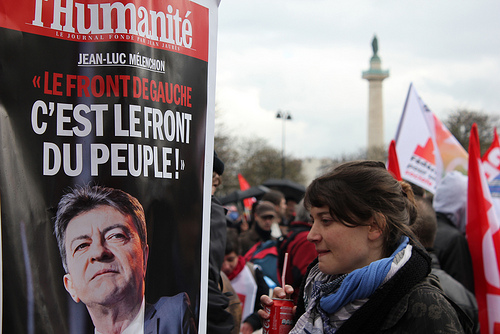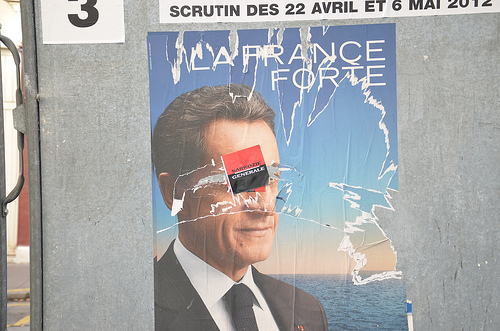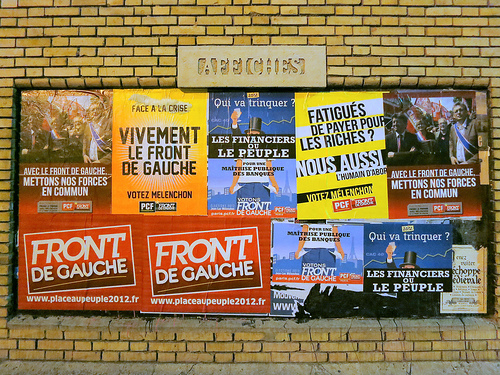John Mullen is an activist in the Gauche Anticapitaliste, part of the Front de Gauche (Left Front). In this article he looks at the first year of Socialist Party President, François Hollande.
One year ago, in May 2012, we were celebrating the defeat of an arrogant right-wing president, Nicolas Sarkozy. François Hollande, newly elected, immediately took a thirty per cent wage cut for himself, promised to tax the rich, give the vote to non-French residents at local elections and take French troops out of Afghanistan.
How is it then that one year later, Hollande’s popularity has plunged faster than anyone thought it would? According to recent polls, only 24% of French people trust him to change things for the better, a lower score than Sarkozy ever had. The liberal weekly Le Nouvel Observateur carried the headline this month: “Is Hollande done for?” Such is the atmosphere of political crisis that Nicolas Sarkozy, who has kept out of politics for a year, is thinking of a comeback.
The main reason for all this is Hollande’s seeming incapacity to do anything effective while unemployment figures are standing at least eleven per cent (the highest for 14 years), tens of thousands are being made redundant and living standards are dropping. Also, the recent discovery that Hollande’s budget minister was himself hiding millions in a Swiss bank account and lying about it in parliament caused a huge uproar in a country where distrust of politicians was already at a very high level.
Hollande in the European Union has supported the institution of stricter rules on budget deficits which are the excuse for ever-harsher austerity measures in several countries. In France, he is clearly opposed to any real resistance to ruling class priorities. His government refused a bill which would have given an amnesty to a number of trade union activists charged with offences linked to strikes, and last week he declared to 300 businessmen he invited to his home that the “first duty” of the government was “to stimulate the entrepreneurial spirit”. While rafts of redundancy plans destroy many thousands of jobs (in oil, tyres, steel, cars and elsewhere), Hollande insists there is nothing a government can do about this, since the market is King. He has ruled out nationalization of industries to save jobs, and the new law he passed, making it easier for bosses to sack people and harder for workers to oppose their sackings at an industrial tribunal, was actually initially drafted by the MEDEF, the bosses’ federation!
Social budget cuts and deregulation continue apace. Reducing the cost of social services to the ruling class is at the centre of attacks on workers worldwide : One of Sarkozy’s major victories was to push through a law which meant people had to work longer for their pension, despite millions going on strike over the issue. Now, Hollande is already saying more sacrifices “are necessary” and 76% of French people do not trust the present government “to guarantee the future of retirement pensions” (which for the moment are considerably higher than in countries like the UK after Thatcher and Blair). We are expecting a major government attack on pensions soon.
Reforms
This doesn’t mean that Hollande’s government has not made any reforms in favour of our class, just that his general policy is in support of the dictatorship of market priorities. One very important reform was the recent legalization of gay marriage. This change came mostly, initially, from the Socialist party itself. Once the Right began organizing enormous demonstrations against marriage equality, gay organizations mobilized in favour of the law, and almost all the radical Left moved into action to build the demonstrations.
In other areas, modest reforms have been carried through. A little more taxing of the rich and better health insurance for the poorest, for example. The government has hired thousands more teachers, is opening far more nursery school places and has moved to stop richer parents choosing more privileged public high schools outside their local area. They have had more social housing built, limited some rent rises and improved retirement pensions for those who started work very young. A ministry for women’s rights has been set up, and women no longer have to pay part of the cost of an abortion. To please another constituency, they have reduced taxes for small businesses and given consumer organizations more power.
On questions of racism, the record is extremely poor. While a law was passed to make it much easier for foreign students in French universities to work in France, other even more important promises have been abandoned. Hollande had said he would make police officers give a receipt whenever they checked someone’s ID papers in the streets, so as to improve the present situation where Black and Arab people are often checked several times a week in Paris and you never see White people being checked. The interior minister, Manuel Valls, abandoned the idea because he says he trusts the police. As for the right to vote for immigrants, this promise, first made by the Socialist Party in 1981, has been abandoned. Meanwhile Valls is carrying out a policy of demolishing Roma encampments, and the numbers of unauthorized immigrants being given papers are no higher than under Sarkozy.
Worse still, the government seems keen to use Islamophobia to gain support. A recent court case where a tribunal found in favour of a woman sacked from a private crèche because she wore a Muslim headscarf was the excuse for the president to insist that he would examine the “need” for a law to stop women wearing headscarves from working with young children ! Interior Minister, Manuel Valls has declared that “The veil, which stops women from being what they are, will always be for me, and should be for the French Republic, something to combat.” In this atmosphere, criminal damage to mosques and to Muslim cemeteries is becoming commonplace.
Resistance on the industrial front
Faced with the social-liberal government, the Trade Union leadership is divided. Several unions have signed away workers’ rights in order to support a ‘left’ government, while others have been organizing resistance, if sometimes rather lukewarmly. There have been several radical strikes over the last year: airline staff, railway workers and television company workers, for example. An important car factory North of Paris has seen a strike lasting several months against its closure, and other fights against redundancies have been highly visible. Local teachers’ strikes against understaffing and arrogant management are not uncommon. And a national mass one-day strike and demonstration against austerity was well-followed, if not at the level of five years back. What is sorely needed are some clear victories for workers in order to inspire further resistance.
Naturally enough the fascist National Front is hoping to gain from the crisis and the disaffection with established parties. It has managed to modernize its image with its new leader, Marine Le Pen, got over six million votes in the presidentials and intends to use the local elections in 2014 to rebuild its weak activist organization, which has not yet completely recovered from the battering it took fifteen years ago from anti-fascist movements, a defeat which led to a damaging split in the FN. The traditional Right is now deeply divided over whether to begin alliances with the fascists.
Left Front
Anti-fascist campaigning is therefore crucial in this period, but only the rise of a Left alternative can brake the rise in fascist influence. And indeed, the situation has led to a sharp rise in political activity by those who don’t think that capitalism can be overthrown any time soon, but who think radical changes can and should be made through a combination of trade union and street struggles and electoral politics (that is to say, there has been a revival of what Marxists usually call Left reformism).
This is what is behind the rise of the Left Front (Front de Gauche), a political bloc including two big parties - the Communist party and the Left Party (Parti de Gauche), and six or seven smaller organizations of a few hundred each, mostly anticapitalist groups and including three organizations which split one by one from the New Anticapitalist Party over recent years.
Its main spokesperson, Left Party leader Jean-Luc Mélenchon, has thrilled millions of workers who want to fight with his impressive capacity to sum up the anger they feel. “Immigrants aren’t the enemy, bankers are!” he declared, and has several times wiped the smug smiles off the faces of conservative journalist interviewers with devastating critiques of the political establishment. “We need to sweep away those in power” he said. Socialist Party reps accused him of dangerous rhetoric which could only help the far right, but were left red-faced when Mélenchon brought out a 1930s Socialist Party poster which carried… exactly the same slogan!
The Front de Gauche is popularizing, with impressive creativity, proposals for left reforms in the interests of workers, for example a ban on redundancies in firms which are making profits. Mélenchon says that social-democracy across Europe has abandoned the workers’ interests and calls for the establishment of a maximum salary, retirement at sixty and a big rise in the minimum wage. Around the country a series of dynamic public meetings and teach-ins keep the political alternative in the public eye. A major conservative daily newspaper, Le Figaro, is asking in its readers’ poll this week ” Is Jean-Luc Mélenchon a political danger for François Hollande ?”.
Naturally, Mélenchon’s ideas include all the contradictions of wanting radical change through the state and without social revolution. In particular, he defends the supposed ‘positive rôle’ of the French army abroad and France’s position as a nuclear power, and believes in the possibility of a revolution “through the ballot box”. In the long-term, in the struggle to overthrow capitalism, no doubt he will not go all the way. But for the moment, the role he plays is very positive, galvanizing and encouraging both workers’ struggles and the struggle for a Left alternative on many questions of great importance for workers.
The Front de Gauche is an umbrella alliance in which each organization keeps to its own principles. The Communist Party is by far the biggest component. A contradictory organization, sections of it concentrate on running town councils and on electoralism, while others are very much involved in trade union and other resistance actions. The Parti de Gauche (which split from the Socialist Party in 2009) has become more of a dynamic activist organization over the last year. It now has 12 000 members and can be seen recruiting students on university campuses, something the activist Left has not been strong on of late. The smaller organizations which are part of the Front de Gauche, each with two to five hundred activists, have been working closely together to form an ‘anticapitalist pole’, an ‘eco-socialist current’ within the Front de Gauche. A joint bulletin produced by six of the organizations, including mine, is making this joint work visible.
Taking the Bastille
The Front de Gauche called a mass demonstration for the 5th of May, one year after Hollande’s election, to demand real left policies, and constitutional change. The demonstration was led by contingents of trade unionists from recent and ongoing strikes and found a tremendous echo. Hundreds of coaches came from around the country. A carnival atmosphere reigned in the Place de la Bastille, with thousands of placards and posters carrying such slogans as “It’s time for the people to take power”, “We will not give up”, “Finance markets are the problem, not the solution” and “Wages are the solution, not the problem”. Many people carried brooms to represent the need for a clean sweep of politics and policies. (Photos at http://www.mediapart.fr/portfolios/bastille-nation-un-dimanche-5-mai ). This collective expression of anger was a great success, and must be only the beginning. Recent dynamic protests against nuclear power and against the building of a new airport confirm that the desire to fight back is widespread.
If the Front de Gauche represents right now the centre of gravity of resistance politics in France, the revolutionary New Anticapitalist Party maintains significant activist forces. It is considerably smaller than it was a few years ago, principally because much of its leadership insisted that Left reformism could not exist or revive and therefore the NPA had nothing to say to activists close to the Front de Gauche except that the Front de Gauche would never fight against Socialist Party policies, an opinion which has proved to be hopelessly out of touch with reality. In a positive move, the NPA participated in the demonstration on the 5th of May, despite some sectarian articles in its paper. The other main revolutionary organization in France, Lutte Ouvrière, denounced the demonstration as “fomenting illusions” in the possibility of reform from above.
Islamophobia
As readers are probably aware, Islamophobia, rooted in a very old French Left tradition of hostility to religious believers, remains rife across all the Left in France, including the Front de Gauche and the New Anticapitalist party. In the Parti de Gauche there are several leaders who would like to see Muslim headscarves banned in workplaces where children are present, for example. The minority of Left activists who want to fight Islamophobia is however bigger than it was ten years ago when headscarves were banned from high schools. At Sunday’s demonstration a ‘collective of Front de Gauche activists against Islamophobia’ gave out leaflets calling for a rally against further islamophobic legislation.
The coming months will see if the widespread anger Hollande faces can be transformed into effective action against government policies and against redundancies.


